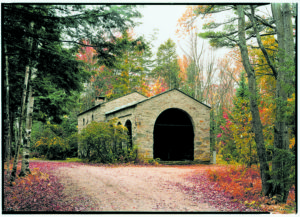
The 82 kW solar system will reduce the colony’s carbon emissions by 140 tons each year.
By Emma Rumple
The MacDowell Colony, in Peterborough, New Hampshire, provides an inspiring environment in which artists can develop their skills. Every year, over 275 artists take part in the Colony’s residency program. They include visual artists, composers, writers, theater artists, filmmakers, architects, and interdisciplinary artists.
Now, MacDowell Colony has set a precedent as the first artist residency program in the country to adopt solar power. It has begun collecting electricity from its solar installation, offsetting 74% of its electric power needs. It is a major move that is part of an on-going effort to reduce fossil fuel consumption. Other work at the Colony has included improving energy efficiency of the buildings.

MacDowell Colony’s Alexander Studio. Photo: Victoria Sambunaris
The Colony’s solar array covers half an acre of the 450 acres in its property. The system has a capacity of 82 kilowatts, and is expected to produce about 185,000 kilowatt-hours of electricity each year. This will supply enough to cover the power needs of the Colony Hall, the largest power consumer among the Colony’s buildings. Colony Hall houses the administrative offices, kitchen, dining area, laundry, and a common space for artists to gather in. The power offset represents over 140 tons of carbon dioxide not being released into the atmosphere each year.
The MacDowell Colony has been actively pursuing renovation of its buildings since 1992, with a view to reducing inefficiencies and dependence on fossil fuels. Providing an example, Resident Director David Macy said, “Eastman studio, our most recent renovation effort is an indication of where we’d like to take all of the buildings on the property.” That renovation started with a drafty artists’ studio. The walls and roof had their thickness doubled, so they could be given good insulation; old windows were replaced with modern energy efficient models, and an air-source heat pump was added.
According to Macy, that was only a beginning. “We started talking solar panels on Colony Hall during renovation planning in 2007.” Now, a ground-mount solar array is installed in a field adjacent to Colony Hall. Not only has the Eastman studio’s heating system been replaced by a heat pump, but the Colony is moving toward supplying the heat pump’s electric power entirely from renewable sources, without any fossil fuels.

MacDowell Colony Hall. Courtesy photo: MacDowell Colony.
Executive Director Cheryl A. Young commented, “From our energy-conserving steps during construction of our new library to on-going studio renovations, we’ve committed to reducing the Colony’s impact on the environment while ensuring its mission to provide ideal working conditions for artists.” She added, “As a leading contemporary arts center, we want our physical plant to be as cutting-edge as the artists who come to work here. The MacDowells would be proud – they liked modernity of the practical kind.”
Non-profit organizations all share a problem relating to federal tax incentives, and the MacDowell Colony is no exception. They have no profits, so they pay no income taxes, and this means that a tax incentive is lost on them. Bob Larsen, one of the Colony’s board members, brought in ReVision Energy of Exeter, New Hampshire, just as the Colony was looking for a solar installer.
ReVision, a certified B Corporation, is one of the largest solar developers in New Hampshire and Maine. It works with IGS Solar, another provider, which invests in renewable energy projects for nonprofit organizations. IGS provided the investment and will own the solar array, selling power to the Colony under a power purchase agreement. IGS, as a for-profit company, can get the tax incentives offered by the federal government, and it uses these to keep costs down for the end customer.
Looking toward the future, David Macy said, “After six years, MacDowell will have the opportunity to purchase the system outright.” The MacDowell Colony has a new goal, to raise the funds for that purchase by 2022. This is the first Artist Residency Program in the nation to go solar.
The IGS Solar website is IGSsolarpower.com.
ReVision Energy’s website is revisionenergy.com.
The MacDowell Colony website is macdowellColony.org








Leave a Reply